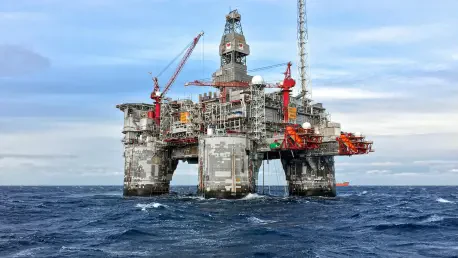In the challenging environment of North Sea oil and gas rigs, a new safety policy by Offshore Energies UK (OEUK) has sparked significant discussion about protecting workers while respecting their personal health journeys. This regulation, set to be fully enforced by November 2026, introduces a weight limit of 124.7kg for workers, fully clothed, to ensure safe helicopter winching during emergency evacuations. The rule considers a total load of 249kg, factoring in rescue personnel, equipment, and stretchers. With an estimated 5,000 offshore employees potentially affected, the policy underscores a critical need for safety in high-risk settings. Yet, it also raises questions about how such measures can be implemented without compromising employee wellbeing. As the industry prepares for this change, the focus shifts to finding a delicate balance between stringent safety requirements and supportive health initiatives, setting the stage for a broader conversation on workplace policies in extreme environments.
Navigating Safety Standards in Offshore Environments
The introduction of a weight limit for offshore workers is rooted in the paramount need for safety during emergency operations, particularly helicopter rescues. Helicopter winching, a lifeline in critical situations on remote rigs, demands precise calculations to ensure that the total load remains within safe operational limits. Exceeding these thresholds could jeopardize not only the individual being rescued but also the entire rescue team. OEUK’s policy aims to mitigate such risks by establishing clear guidelines that prioritize physical safety above all. With a phased rollout beginning with awareness campaigns from November 2025 to January 2026, followed by a transition period, the industry has time to adapt. This structured timeline reflects an understanding that immediate compliance may not be feasible for all workers, highlighting the necessity of preparation and education to ensure that safety protocols are met without undue pressure or haste, fostering a smoother integration into daily operations.
Beyond the technical aspects of weight limits, the policy’s impact on operational dynamics cannot be overlooked. Offshore environments are inherently isolating, with workers often spending extended periods away from home, facing physical and mental challenges. A safety measure like this, while essential, could inadvertently heighten stress if not handled with care. OEUK emphasizes that the goal is not to penalize individuals but to protect them, advocating for employer-led initiatives that support gradual weight management. This approach acknowledges the diverse circumstances of workers, from varying fitness levels to personal health conditions, ensuring that safety standards do not become a source of exclusion. By focusing on proactive measures, such as providing resources and time for adjustment, the policy seeks to maintain operational integrity while safeguarding the workforce, demonstrating that safety in high-stakes industries requires both precision and empathy in equal measure.
Prioritizing Employee Wellbeing Amidst New Regulations
Implementing a weight limit policy in a way that respects employee wellbeing is a complex endeavor, requiring more than just regulatory enforcement. Experts in workplace health stress the importance of guidance over strict mandates, suggesting that employers offer tools like nutrition education and wellness apps to encourage sustainable lifestyle changes. Cecilia Hellström from Lifesum highlights the need to avoid stigma by fostering open communication and confidential support systems. Healthy catering options on rigs and tailored advice can make a significant difference in helping workers meet safety thresholds without feeling judged or pressured. This perspective underscores a shift from viewing weight as a compliance issue to treating it as part of a broader health conversation, ensuring that workers feel supported rather than targeted by policies designed for their protection in emergency scenarios, ultimately building trust within the workforce.
A deeper exploration of wellbeing reveals that addressing weight limits is only part of a larger puzzle in offshore workplaces. Bernard Yew from PAM Group advocates for comprehensive initiatives that tackle underlying factors like emotional stress or poor eating habits, which often contribute to health challenges. Encouraging healthier eating, regular movement, and proper lunch breaks can counter myths that nutritious lifestyles are costly or time-intensive. Meanwhile, Ellie Hickman from HCML proposes reframing the dialogue to focus on overall happiness and health, using one-to-one consultations and webinars to address nutrition, exercise, stress, and sleep. Such multifaceted approaches ensure that workers are not reduced to mere numbers on a scale but are seen as individuals with unique needs. By embedding these supportive measures into workplace culture, employers can help employees adapt to safety requirements while enhancing their long-term resilience and quality of life in demanding conditions.
Building a Culture of Support and Long-Term Health
The consensus among industry voices is clear: safety policies like weight limits must be paired with non-discriminatory, empathetic strategies that prioritize long-term health over short-term fixes. This means moving beyond rigid targets to cultivate environments where workers feel empowered to improve their wellbeing at their own pace. Employers are encouraged to listen to grassroots initiatives from the workforce, which often provide practical, relatable solutions that resonate more deeply than top-down directives. Graham Skinner, OEUK’s health and safety manager, has emphasized that weight management is a personal journey influenced by numerous factors, and a phased introduction helps prevent job losses. By integrating personalized support and fostering dialogue, the industry can ensure that safety measures enhance rather than detract from employee morale, creating a model for how regulations can align with human-centered values in even the most high-risk settings.
Looking ahead, the success of this policy hinges on sustained commitment to balancing safety with individual care. Reflecting on past efforts, the phased rollout and focus on resources rather than penalties marked a significant step forward in addressing the unique challenges of offshore work. As enforcement approaches in 2026, the emphasis remains on actionable solutions, such as accessible wellness tools and ongoing education, which help workers meet requirements without stigma. The integration of diverse expert insights into workplace practices demonstrates a nuanced approach, ensuring that safety protocols are both practical and humane. Moving into the future, the industry is poised to set a precedent by continuing to invest in holistic support systems, reinforcing that strict regulations can coexist with compassion. This legacy of prioritizing both emergency preparedness and personal health offers a blueprint for other sectors grappling with similar challenges, proving that safety and wellbeing can indeed be harmonious goals.









